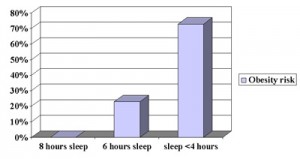Sleep deprivation is a common problem in a society governed by stress and hurry. Less hours of sleep may give us the illusion of being more effective, but it seems to be at the expense of our health. Lack of sleep affects our brain metabolism in various ways, and researchers at Columbia University recently examined data on 6115 people, ages 32 to 59 from a U.S. National Health and Nutrition Examination Survey. The findings were presented at a recent meeting of the North American Association for the Study of Obesity. Of those who slept less than four hours per night 73% were more likely to be obese. Those who slept six hours per night were 23% more likely to be obese. The findings further suggested that in people who sleep less than eight hours per night (about three quarter of the 1024 participants), body mass index was inversely proportional to sleep duration.
The researchers also reported the reasons for that. Sleep deprivation lowers leptin, a blood protein that suppresses appetite and sends the signal, when the body had enough food. Lack of sleep also raises ghrelin levels, a polypeptide hormone from the stomach wall, which makes people want to eat. Laboratory tests of one study showed that making do with only four hours of sleep resulted in an 18% reduction of the leptin (the “appetite stopper”) and a 28% increase of the ghrelin (the “appetite animator”). Translated into plain text, it means that the breaks were removed and the signal given to eat by 46% more than in persons with a sufficient dose of sleep.
| Increase of obesity risk due to sleep deprivation |
In addition sleep deprived healthy persons in their 20’s also craved more sweets and starchy foods than well-rested individuals and these added calories are stored as body fat. These hormonal changes are the biochemical evidence pointing to the connection of a sleep-deprived lifestyle with obesity and the associated health problems like diabetes and cardiovascular illness.
Drastic diets don’t seem to hold the answer. Part of the entire picture may be as simple as sleeping more and as a result weighing less.
Reference: The Medical Post, February 1, 2005,page 17
Last edited December 7, 2012







